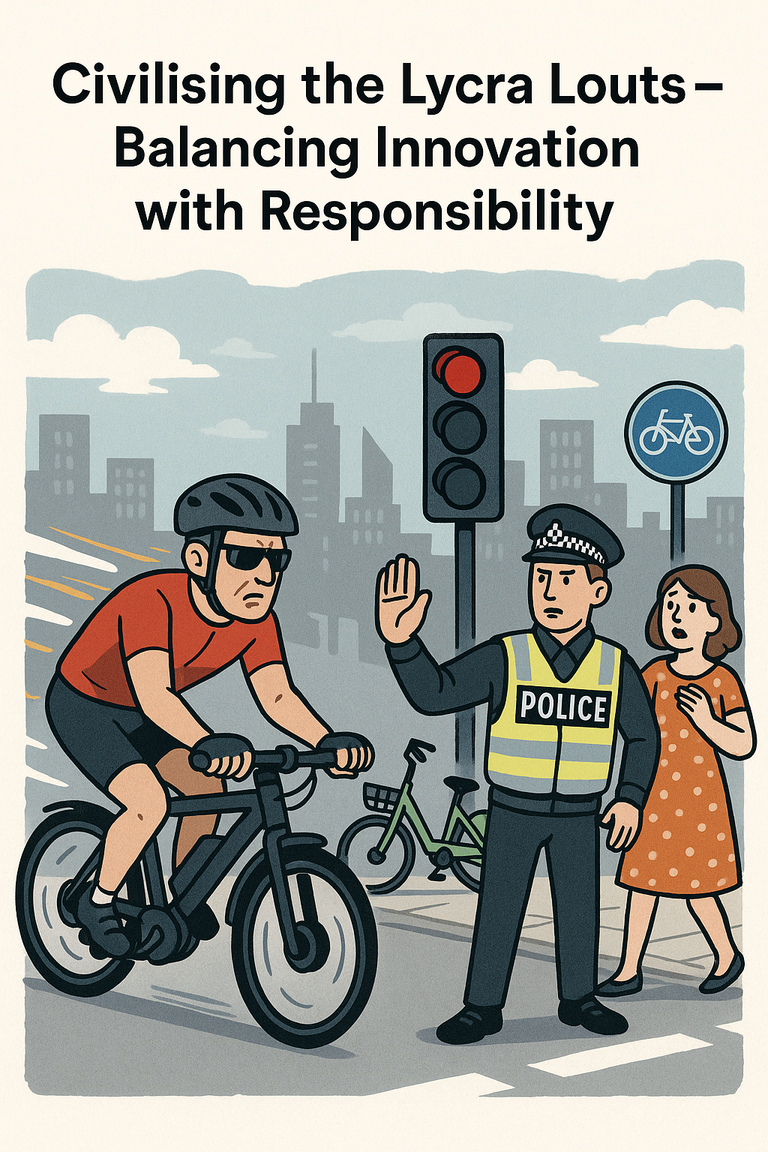E-Bikes on the increase, and so is discourtesy of use!
There has been an enormous take up of E-bikes over the last few years, with E-bikes replacing car journies at a rapid pace in inner cities.
This is no surprise given the ease of travel on them, almost no effort, and at first glance this seems like a massive WIN for the UK - with no obvious CO2 emissions into our air.
But the increase of E-bikes has not been met with an increase in regulation, and thus there has also been an increase in MENACE from a few of these riders.
Many riders, typically on high-powered e-bikes, flout traffic, ride on red lights, and are common to cut diagonally at perilous speeds to get between pedestrians. Some leave their bicycles littered on pavements that imperil mobility people.
It's a problem we could have forseen, but city centre infrastructure is hard to change so it's unsruprising it has lagged behind the rapid take upn of this new green tech.

There is enforcement in some places...
In London's Square Mile, police stop and search, penalize, and confiscate illegally adapted bicycles. In European cities, overt branding on hire cycles enables tracking of offending cyclists and encourages responsibility.
The other issue is the economic model of e-bike sharing. Companies are mostly implementing a minute-wise rate so that users travel extremely fast and take shortcuts for most of the routes to avoid costs. Bolt's distance-charging model rather than time-charging is an intriguing aspect that does not cost much to make trips unacceptably costly. It would also eliminate the urge for the use of unsafe shortcuts.
Gently gently...?
Maybe what we need is something like the good old seat belt campaign from a few decades back, mass and sustained advertising to guilt trip E-bike users into being more courteous, basically!
It's also worth exploring technological solutions. Geo-fencing could slow down e-bikes automatically in pedestrian-heavy zones. Apps could require customers to snap a photo of bikes in bike corrals prior to a ride completing. Operators could even be fined for repeated abuse by their customers, encouraging them to police their fleets.
Ultimately, e-bikes are not the problem!
This is a classic case of good tech, bad actors!
It's a matter of having streets where all road users — on two wheels, four, or two — can safely and harmoniously coexist.
Posted Using INLEO
Some of the food delivery riders are pretty reckless and you don't hear them coming. We don't get many of those around here, but there are adults who cycle on the pavement even though the road through the village is not that busy. I want to see more cyclists, but they need to look out for others.
There's so many in London, in 20 MPH zones it's a real pain.
Share the road!
I love my ebike and I obey all traffic laws! Wish everybody else would do the same!
Oof! But also hilarious!
There need riders to be more accountable to keep everyone safe on the roads. Let's encourage responsible riding and foster a culture of courtesy!
In my country, according to the new rules, all electric bicycles and scooters must ride on pedestrian paths. This is very inconvenient for pedestrians, because sometimes these bicycles rush by at a good speed. It would be good if there were bicycle paths everywhere.
Roads would make more sense surely?
An increase in E-bike will sure cut off lots of energy consumption even adding to its green energy effects.
The best way is to work on bike trackers so to penalize defaulters. Just as your said, the problem here is the bad actors.
I feel some kind of tighter regulation incoming for sure, maybe trackers!
it's spot on how they've disrupted urban mobility for the better, slashing car trips and emissions, but at the cost of some riders turning streets into free-for-alls. I especially appreciated your nod to economic incentives like minute-based pricing fueling risky shortcuts; shifting to distance models, as you mentioned with Bolt, could indeed temper that rush. One minor quibble: the bit about "imperil mobility people" left me pondering if you meant folks with mobility challenges—totally get the intent, though, as those haphazardly parked bikes are a real hazard. Overall, your call for tech fixes like geo-fencing and cultural nudges via campaigns echoes classic sociological shifts in norms, much like the seatbelt era.
That was it, the less mobile are less able to jump out of the way!